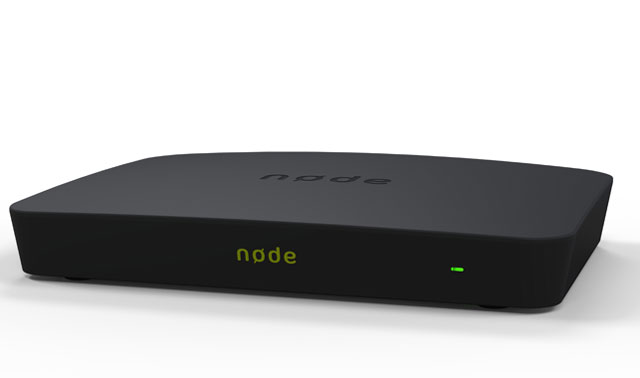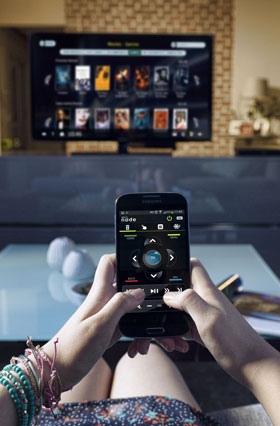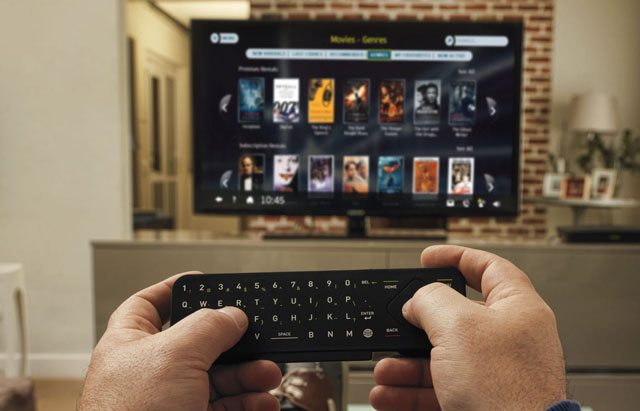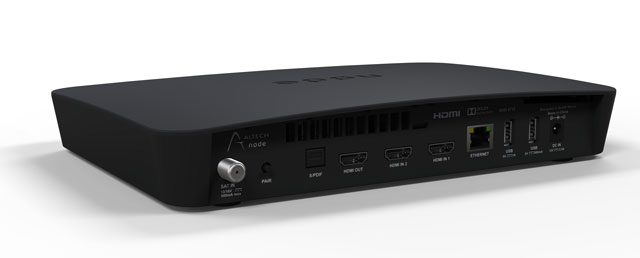
Technology group Altech, part of the JSE-listed Altron stable, on Thursday evening announced that it is making a big play into the video-on-demand (VOD) and home automation markets with a new, satellite-based home entertainment product called the Node that it hopes will become a significant new revenue stream for the group in coming years.
The Altech Node platform incorporates the second VOD service to be launched in South Africa in as many weeks. Unlike Times Media Group’s Vidi service, however, the Altech Node is a satellite-connected box that delivers “push VOD” content — much of it in full 1080p-resolution high definition — to subscribers.
Content is delivered over satellite, which subscribers can then watch “on demand” from the set-top box’s built-in 1TB hard disk drive.
Altech believes this is a better model than delivering content over the Internet in a country where the fixed-line broadband network remains relatively poorly developed and expensive. The service uses Intelsat-20, so DStv subscribers don’t have to install a new dish.
Sentech has been contracted as signal partner.
The Node was developed by the Durban-based Altech UEC, South Africa’s largest set-top box and decoder manufacturer. Subscriptions cost R299/month and there’s an upfront R3 499 fee for the set-top box, which includes installation of either a new dish or quad-LNB (low-noise block downconverter) on an existing DStv dish installation. A contract option is also available through Altech Autopage, the group’s cellular service provider, allowing consumers to amortise the upfront cost of the set-top box over a 24-month period.

“The idea for the Node was incubated three years ago,” Altech CEO Craig Venter tells TechCentral. “We then invested 40 000 man hours on software development alone.”
Indeed, Altech roped in seven group companies into the Node’s development, which involved building the set-box, creating billing and customer relationship management platforms, establishing a call centre, and even building an online commerce payments platform.
“We own everything, not just the set-top box,” Venter says. “We have more than 40 patents across all the countries where we intend selling this product.”
In some markets, Altech intends making the Node available as a white-labelled solution, allowing other companies to brand it and market it. In South Africa, though, Altech is taking it directly to market.
The group expects to sign up tens of thousands of subscribers in a “very short space of time” and is targeting hundreds of thousands of subscribers in the longer term, according to Venter. “Initial indications are good. Retailers wouldn’t be placing orders unless they felt comfortable.”
Altech has reached agreements with a number of retailers and service providers for the commercial launch.
Dion, Game, Makro, Incredible Connection, OK Furniture, Hirsch’s Homestore, Jet Mart and Pick n Pay will all sell the Node and its associated home automation, security and other accessories.
Cell C has been chosen as the launch mobile network partner, though Venter says the company is open to discussions with MTN and Vodacom as well. The two larger mobile operators are known to have been considering VOD services of their own for some time, though neither has launched a commercial product.

For the Node launch, Altech has secured a range of content. This includes deals with four of the six major Hollywood studios — MGM, Disney, Universal and Sony.
It offers a mix of transactional and subscription-based VOD. For the R299 monthly fee, viewers get access to a catalogue of television series — shows such as Weeds and Mad Men — as well as older movies. It will also offer popular series from US cable provider HBO, though not at launch.
Its transactional VOD platform, which is similar to DStv’s BoxOffice service, offers the latest Hollywood movies just after they’ve come off the cinema circuit at a rental fee of R25 — R2 below BoxOffice. Older but popular movies will fetch R15 a piece. Viewers can rent movies for a period of 48 hours. There are more than 100 movies available to rent at any given time, with this catalogue set to be refreshed at a rate of 10 new titles a month.
On the subscription platform, 10-15% of the content will be refreshed each month, Altech says. The Node has 140 subscription movies and 200 series episodes at launch. There’s also children’s content, offering 150 episodes of material, as well as 150 episodes of documentaries. Sports content includes 80 episodes covering sporting codes such as cycling, golfing and extreme sports.
Most of the content — between 80% and 90% of it — is offered in 1080p resolution. The box supports the DLNA (Digital Living Network Alliance) standard, meaning multiple compatible household devices — up to five — can be connected and used to watch content from the Node, delivered over Wi-Fi. Consumers can also watch or listen to their own media by plugging in an external hard drive or a flash drive, with a range of file formats supported.
Altron group executive for technology and strategy Willie Oosthuysen says that because the Node’s content is delivered via satellite, the group can afford to send large files to the set-top box without worrying that consumers will experience buffering or other problems typically associated with the delivery of streaming content over the Internet. “The files are huge. We deliver Blu-ray quality with no negative impact to the customer,” Oosthuysen says.
The content on the Node is protected using Microsoft PlayReady digital rights management technology. Altech has separated the encryption key from the content, so users must connect to a cloud service to unlock the programming they want to watch. The Node includes integrated Wi-Fi and 3G for Internet access and comes with a prepaid Sim card from Altech Autopage with R10 of airtime to allow users to register and begin their viewing experience.

Venter does not view the Node as a direct challenge to MultiChoice, which is an important customer of the group through Altech UEC. Although there is some overlap with MultiChoice’s BoxOffice offering, Venter says the Node does much more — including home security automation and Internet telephony — that isn’t core to broadcasters’ businesses. Indeed, Altech offered MultiChoice the option of partnering with it for the Node’s launch, but those talks didn’t lead anywhere, Venter says.
The Node also includes a bank-agnostic payments system, allowing people to use it to buy goods and services online securely. “We purchased [payments specialist] Eyenza two or three years ago specifically for this, to get the billing platform for Node,” Venter says.
Altech Card Solutions has provided a Postilion switch at the backend, too. “You can go online with your credit card or use the built-in digital wallet through the browser in the device,” he says.
“The commerce system in the box can be leveraged for many things. You can purchase pizza from Mr D at launch, or pay municipal accounts or traffic fines.” Spending limits can also be set, as, of course, can age restrictions for content.
The Node has four distinct virtual machines (VMs), one of which runs Android, meaning consumers can install a range of vetted applications, including Facebook and Twitter.
They can also download games.

Oosthuysen explains that separate VMs are needed because the studios don’t allow Android in the same VM as their encrypted content. “We had to firewall each of these separately,” he says. “One is secure content, one is the Android environment that runs the apps, then you have the environment for non-secure media, and there’s the value-added services area.”
Altech will offer a range of value-added products with the Node, which will be available through the same retail channels as the box itself.
These products are a high-end security camera and a lower-end security camera; motion sensors; a ZigBee smartplug, which is used, for example, to turn lights in the home on or off; a Node-branded USB flash drive (most flash drives up to 16GB in size are supported using the FAT-32 file format, while external hard drives of up 3TB can be used); a 3G antenna to boost cellular signal; a Wi-Fi range extender; and a voice-over-Internet protocol phone (supplied by Autopage). — (c) 2014 NewsCentral Media




